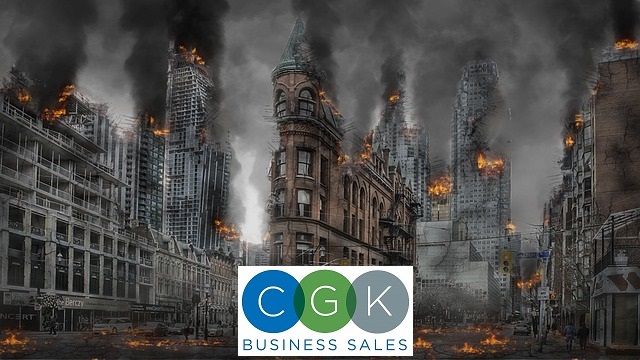Why Continuity Is So Important When Buying Established Businesses

Why Continuity Is So Important When Buying Established Businesses
Buying a business is a time-consuming and uncertain process even under the best of circumstances, and the lack of continuity planning on a seller’s part will make the purchase even more difficult. Without a plan in place, a potential buyer may not know what to expect when things go wrong—and an owner may miss a sale. Here, we will discuss the basics and importance of continuity planning for business owners, sellers, and buyers. This article explains why continuity is so important when buying established businesses.
What’s Involved in Continuity Planning?
Business continuity plans are procedures that ensure a company’s sustained operations during cyberattacks, fires, natural disasters, and other events. A continuity plan focuses on what to do during a disruption, while a recovery plan is centered on returning operations to normal after such an event.
Why Do Sellers and Buyers Need Continuity Plans?
Business owners have long to-do lists, which get even longer when putting a company up for sale. During hectic times, it’s all too easy to let continuity planning fall by the wayside—especially for skeptics who think the worst will never happen. As we’ve learned from the events of the past several years, however, numerous factors can affect a company’s performance, and by extension, customers’ trust in its products. With careful risk assessment and planning, a business owner can reduce the effects of a crisis and make their company look more appealing to potential buyers.
Below are a few major benefits of continuity planning for business owners and buyers.
- An assurance that operations will continue. A continuity plan’s primary aim is to keep a company going when dreadful things happen. For instance, if a business is in a storm-prone area, an owner may wish to invest in backup generators to keep the lights on during a power outage.
- Protection for employees. During the pandemic, many companies shifted to a work-from-home model, but few were prepared for the effects of such a change. When an owner includes a continuity plan that makes it easier for employees to work from home, their most important resources are protected and the company itself looks better to potential buyers.
- Building brand recognition and trust. A data breach can ruin a company’s reputation overnight. Customers expect 24/7 availability, and that their sensitive information will be protected. As part of an overall continuity plan, cybersecurity planning reduces the risk of data breaches and downtime while positioning a company as a trustworthy, reputable source.
- Mitigating financial losses. The recent economic downturn has caused the country’s businesses significant financial losses. In a time when customers are cutting back, businesses—especially those that are going up for sale—need continuity plans to diversify revenue streams and cut losses.
If it’s time to sell your business in Austin, it’s important to consider the risks and plan for a smooth transition. In the sections below, we’ll outline the creation of a continuity plan before putting a business up for sale.
Creating a Pre-Sale Continuity Plan
Continuity planning isn’t a one-off process. It can take months to go over all the details, get approval from stakeholders, and train team members on the plan’s details. Ideally, the process should begin long before a company is put on the market. Follow these steps and understand why continuity is so important when buying established businesses:
- Set a goal. Most buyers look for continuity plans that protect assets and employees when crises occur.
- Create a team. Before deciding who will execute the plan, outline responsibilities such as risk assessment, program management, and stakeholder notification. This step is crucial when selling a business, as it will keep stakeholders on board during the transitory period.
- Figure out assets, risks, functions, and effects. The most common threats include power outages, fires, natural disasters, public health emergencies, terrorism, economic upheaval, cash flow issues, legal disputes, accidents, and technology failures. All these crises put inventory, property, people, and customer relationships at risk. When an owner enacts a solid continuity plan before selling a business, however, a buyer will go into the process ready and well-informed.
- Set training deadlines. Once the risk, asset, and functional assessment is complete, the seller must train key employees and stakeholders. By training the entire staff, a business owner will ensure that everyone has the knowledge needed to continue operations in case of a disaster.
- Point out vulnerabilities and find alternatives. After creating a plan, note the business’ most significant weak spots. For instance, e-commerce retailers may depend on a single vendor or shipping company, and they may be vulnerable to DDoS attacks. Determine the likelihood of these issues and prioritize solutions accordingly.
- Choose responses for each vulnerability. Once a list of fixes has been made, pair each problem with a corresponding solution. For example, continuity planning for a server failure may come in the form of a redirect to an app or a social media page. Buyers also like to see strong recovery plans that help businesses get back up and running after a crisis. In the example mentioned above, the best idea would be to upgrade the company’s web hosting.
- Solicit feedback. Asking for stakeholders’ feedback will ensure that there are no gaps in the continuity plan. A business seller’s goal should be to create plans that consider all potential failures and outline how they’ll continue operations after such occurrences.
Business continuity plans don’t just help companies survive disasters; they also do their part to ensure the success of an impending sale. Knowing who stakeholders are, which events are most likely to occur, and how to mitigate risks ensures employees’ safety, reduces monetary losses, and improves a brand’s reputation.
Build a Strong Continuity Plan and Increase the Chances of a Successful Sale
When vulnerabilities are disregarded, the risk of an unrecoverable crisis increases. Don’t leave the new owner holding the bag—form a reliable continuity plan before selling your business, and work with the experts at CGK Business Sales to ensure a smooth and successful transition. In the meantime, think about why continuity is so important when buying established businesses and you’ll understand the buyer’s mindset. Request more information via our online form, click to get an expert valuation, or call our Austin office to get started.

